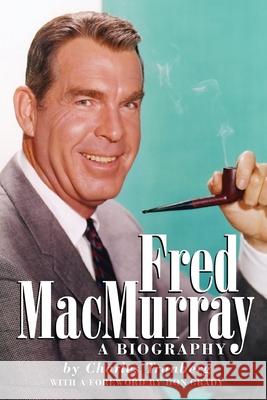Fred MacMurray » książka
Fred MacMurray
ISBN-13: 9781593930998 / Angielski / Miękka / 2007 / 392 str.
Fred MacMurray was one of the most durable stars in motion picture history. Fred arrived in Hollywood in 1934 and within a year he was one of the top leading men in the movie industry. He was the leading actor or one of the leads in films through 1973 when Walt Disney Studios released his final starring role in a motion picture, Charley and the Angel. Thirty-nine years - five separate decades. Few stars have equaled that distinction.
Fred MacMurray was one of the most durable stars in motion picture history. Fred arrived in Hollywood in 1934 and within a year he was one of the top leading men in the movie industry. He was the leading actor or one of the leads in films through 1973 when Walt Disney Studios released his final starring role in a motion picture, Charley and the Angel. Thirty-nine years - five separate decades. Few stars have equaled that distinction.Of course every star career has its peaks and valleys. The initial peak of Fred;s stardom was from his days as a Paramount leading man, beginning in 1935 and running roughly until the end of the Second World War. Like many aging stars, the post-war years were a mixed bag for Fred. Public tastes were changing and the kind of frothy, romantic comedies which had been his forte were going out of fashion. But he persevered and continued to do leading roles in a variety of pictures and from time to time found a film which registered strongly with film audiences and critics alike, such as The Egg and I (1947), and especially The Caine Mutiny (1954).By the mid 1950s Fred was appearing, increasingly, in that favorite genre of the aging leading man - the western film. Eight of ten films he made between 1955 and 1960 were westerns, not Freds favorite genre. But they did keep his name before the public.Then in 1959, Fred began the second peak of his career thanks to Walt Disney, who cast Fred in his studios first live action comedy film, The Shaggy Dog. Incredibly this film which was made for under $1 million became the third biggest box office hit of that year, and Fred found a new audience. Over the next several years, Fred starred in a series of hugely popular family films for the Walt Disney Studios.Then in 1960, Fred did something that solidified his new family friendly image. He accepted the lead in a new television series called My Three Sons. For the next twelve years he played Steve Douglas, a widower with three rambunctious sons. Fred became THE quintessential father figure for a new generation of kids.In accepting My Three Sons Fred succeeded at something that few film actors had achieved up to that time. He became a star in both television and motion pictures. Look at it this way. In 1951 when Lucille Ball began I Love Lucy she had already spent nearly two decades as a motion picture actress, but she never had the kind of movie fame that Fred MacMurray had achieved when he became a television star. Loretta Young began a long running anthology series in 1953, and had been a popular, and Academy Award winning, movie actress prior to that, but when she began on television her days as a film actress were over. When Fred began doing My Three Sons in 1960, he was enjoying a rejuvenated film career thanks to the Disney films and his superb performance in Billy Wilders hugely popular and Academy Award winning The Apartment. Fred was simultaneously enjoying popularity on both the big and small screens. Many film actors attempted this after Fred, including his contemporaries Jimmy Stewart and Henry Fonda, but both proved failures in their own series.











